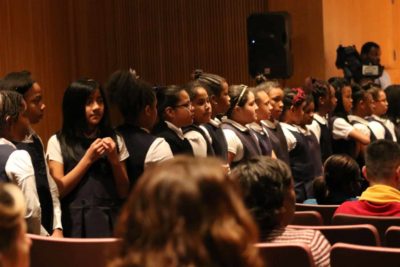
I’ve worked in education for more than 20 years, and learned more than I ever could have imagined about charter school history, impact, and why families choose them. I’d like to walk you behind the scenes of charter schools and give you a tour of these details, especially the NC ACCESS Program and what it means for students in our state.
Yes, charter schools receive taxpayer funding — we’re public institutions, and proud of it. Public charter schools were introduced in North Carolina in 1996 to create more free, public learning opportunities for kids. Compared to traditional public schools, the charter model has more flexibility, making it easier to modify the school day or curriculum. Each school’s charter is developed to meet a specific community need — maybe we’re a technology school or a literacy-focused school in a low-income area. Our charters also make us accountable for results — both to parents and to the authorizer that granted the charter.
From the start, the spirit and mission of North Carolina charter schools has been to complement the traditional district system and serve all children a free, innovative, high-quality education, regardless of race or income. While the charter sector has consistently striven to live out that mission, the NC ACCESS Grant is helping us take incredible new strides in doing so.
In 2018, the state received a five-year, $36.6 million grant from the federal Department of Education. That grant — the NC ACCESS Program — is helping to expand access to charter schools for educationally disadvantaged students and train new leaders who can disseminate best practices for charter schools.
Excitingly, it’s working. Public charter schools are learning transportation and lunch service strategies to remove invisible barriers for low-income students. During the first full year of the program, six subgrantees enrolled more than 250 additional educationally disadvantaged children in their schools.
While some people consider charter schools selective, the only truth in that statement is that many of our schools have waiting lists for admission. In fact, while traditional public schools and charter schools serve about the same proportion of Black students, charter schools have attracted significantly more Black teachers. Not only does this point to the charter community’s inclusivity, it means that Black students are more likely to reap the benefits of having a teacher who shares their ethnic or racial background at a charter school.
The excess demand for charter schools is proof positive that families of all races and economic backgrounds see charters as the best of the best in public education. But we don’t charge tuition, and we solve the problem of too many students trying to fill a finite number of places in the fairest manner possible — we hold an admissions lottery.
Partially inspired by the NC ACCESS Program, more and more of our charter schools are using weighted lotteries, in which educationally disadvantaged groups receive preference when selecting students for admission. This mechanism works to level the educational playing field by giving the proverbial leg up to students from lower-income families or students with disabilities.
Through the grant, charter school leaders around the state are also learning best practices and putting those into practice. One participant and teacher, Dr. Tremaine Canteen from The Capitol Encore Academy, described that the program developed school leaders “to design highly effective organizations capable of meeting the needs of all students, especially the most at-risk due to socio-economic and environmental factors.”
This care for providing the best opportunities for all populations, especially at-risk populations, is nothing new for public charter schools — it’s the very thing the public charter sector was created to do. Thankfully, the NC ACCESS program is providing resources and assistance so our charter schools can live that mission more completely.
Charter schools are one option of many in North Carolina — there are also district schools, magnet programs, home schools, online education, and private schools — but they are an especially pioneering option. Responsiveness to families, innovation, adaptability — these quintessential charter school qualities are exactly what many families are seeking as the pandemic’s impact lingers.
This School Choice Week (Jan. 24-30), the palpable momentum charter schools are gaining from the ACCESS Program, and the freedom to more fully serve all students, is something to celebrate.



